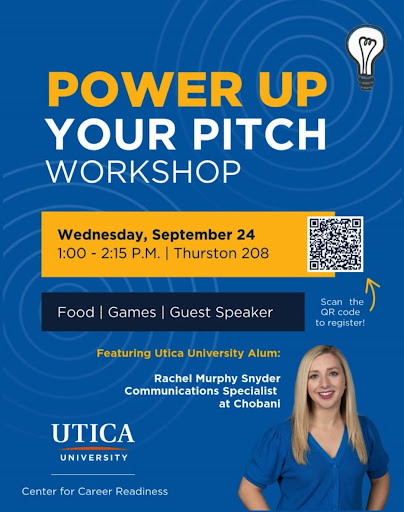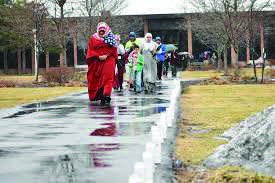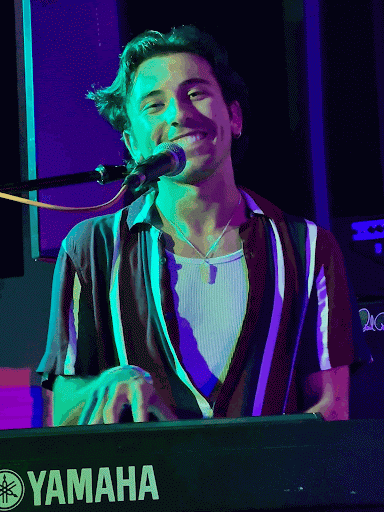On March 15, there were two consecutive terrorist attacks in mosques in Christchurch, New Zealand, during Friday prayer; 50 people died and others were wounded.
But in the wake of the tragic killings, there has been worldwide solidarity shown that transcends religious backgrounds and beliefs. In the days following the shootings, many people of different faiths from around the world were seen outside of mosques protecting Muslims during their prayers.
These signs of unity have also been seen throughout the city of Utica.
Mariam Muya, who is part of the Muslim Student Association at Mohawk Valley Community College (MVCC), put together a vigil with Imam Amsal Memic from the Bosnian Islamic Association. All people of all faiths and backgrounds were invited to stand united against violence and hate. The vigil honored all the lives lost during the Christchurch terrorist attack at Al Noor and Linwood Mosque.
When talking about the attacks, Muya said it still feels like they happened yesterday.
“We’re afraid,” she said. “What if that happens in our community, what if that happens in our very own Masjid (mosque), are we safe, should we feel safe? Is this going to happen in our community? Are we being targeted too, because we are at the mosque every week just like those who lost their lives in a mosque?”
Muya continued to say that it is important to come together in times of adversity and prejudice.
“We are one, we are them,” she said. “Hate cannot divide us, but it will build us and solidify our love and unity for each other in humanity.”
Muya said she put the event together because she believes everyone is “created by the same God, even if we call Him by different names.”
“Allah, God and Yahweh; that hate cannot divide us, not today or ever,” Muya said. “Quran 49:13 reads, ‘O’ Mankind, we created you from male and female, and made you into races and tribes, so that you may identify one another. Surely the nobles of you, in Allah’s sight is the one whip is most pious of you. Surely Allah is all-knowing, all-aware.’”
Muya added that that was a lesson for everyone as Muslims and non-Muslims. She said the incident brought everyone together and the vigil received a lot of support that from all races, religions and backgrounds.
“In Islam we’re taught to love and forgive, even the ones who hurt us; we are not angry with him (the Christchurch shooter) for what he did, and we can’t blame him for what he did,” she said. “We blame Shaaytan (Satan). We forgive him, and we ask God to forgive him just like many of the families already forgave him because Islam teaches us to forgive one another no matter what the situation has been.”
Executive Director of the Jewish Community Center (JCC) Victor Pearlman was also in attendance for the vigil. Pearlman said he looks at unity and support as something that should be an easy question to answer, “Why wouldn’t I help?”
Pearlman was raised in a Jewish home and says he was taught to be kind and helpful. When the attack at Christchurch occured, he felt it was his responsibility to support the muslim community and it felt like a natural thing to do.
“When my friends and neighbors had a terrible episode or something affected them deeply, it was my job to help them in any way that I could and in this particular situation, the best way I could really help them was to just support them,” he said.
He said “to be there for each other makes life all that more meaningful.”
“And perhaps because of the way I was raised, I would do that for people that I didn’t really know or who weren’t necessarily my neighbors,” Pearlman said. “Hopefully, I care enough about humanity that I would do that, too.”
He mentioned that he has been friends with the community that was directly affected by the New Zealand shooting. He knows if anything were to happen in the Jewish community, the Muslim community would extend their help.
“In fact, there was an episode about two or three months where there was a shooting in a synagogue in Pittsburgh and several of my friends from the Muslim community were at an event at the synagogue to memorialize those people,” he said. “I don’t think they really thought any other way either.”
Pearlman attended the vigil at MVCC and felt the unity of different religions and backgrounds.
“It wasn’t my place, but if I could have or if it would have been appropriate, I would have hugged each and every one of those students like they were my child; I almost felt that kind of responsibility,” he said.
He added that there were other pastors and priests from other faiths and he believes “they all felt the same way.”
“I wanna say that is what makes Utica such a great place,” Pearlman said. “But, hopefully, it’s not just Utica; hopefully, it’s everywhere, and if we all take care of our own places and people it would be a lot nicer and these things would be less prevalent.”






































































































































